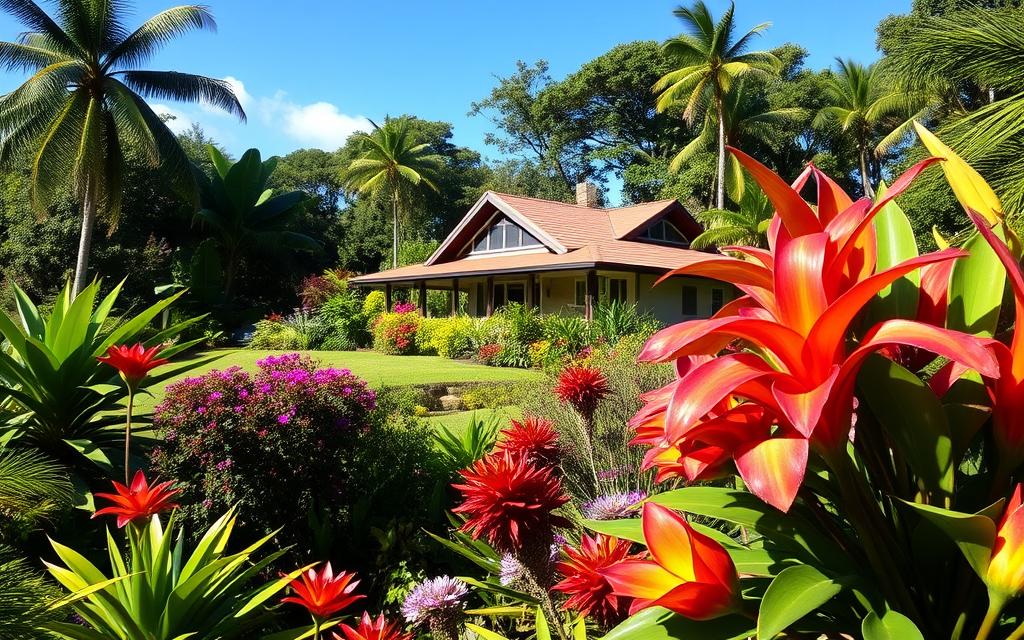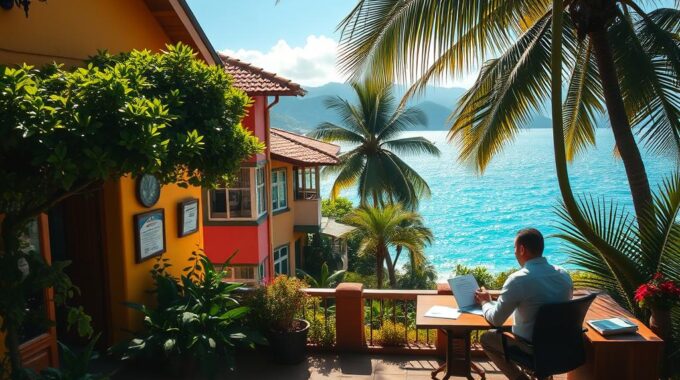Learn about hard money lending for financial freedom Costa Rica. GAP Investments offers tailored financing from $50,000 to $3,000,000.

Digital nomad visa vs residency in Costa Rica: Which is Right?
Thousands of remote workers have been drawn to Costa Rica since its digital nomad visa was launched in 2022. This Central American country has become a haven for expatriates and digital nomads alike, offering a unique blend of modern amenities and a tropical paradise.
Costa Rica Immigration Experts (CRIE), a trusted firm with over 20 years of experience, has helped numerous clients achieve their dream of living in this beautiful country. With its stable government and lush landscapes, Costa Rica is an attractive destination.
Choosing between a digital nomad visa and traditional residency requires understanding the differences, benefits, and limitations of each pathway. The digital nomad visa offers a streamlined approach for temporary residence, while traditional residency provides a path to permanent status.
Understanding Costa Rica’s Immigration Landscape
As a premier destination for expatriates, Costa Rica’s immigration landscape is characterized by its flexibility and diverse pathways. Costa Rica has established itself as a haven for individuals looking to relocate, whether for retirement, investment, or remote work.
The Appeal of Costa Rica for Expats and Digital Nomads
Costa Rica’s appeal extends beyond its stunning natural environments to include a high standard of living, exceptional healthcare system, and a welcoming expatriate community. The country’s political stability and well-developed infrastructure further enhance its attractiveness.
- Multiple pathways to legal residency catering to different financial situations and lifestyle preferences.
- A lower cost of living compared to many Western countries.
- A diverse range of visa categories, each with unique benefits.
Overview of Available Immigration Options
Understanding Costa Rica offers several immigration options, including temporary and permanent residency pathways. The Pensionado visa is ideal for retirees, while the Rentista visa is suited for those with a steady income. For investors, the Investor visa opens doors to business opportunities.
Costa Rica’s immigration system is known for its flexibility and accessibility, making it an attractive option for digital nomads and those seeking residency. Each immigration option comes with its own set of requirements and benefits, requiring careful consideration of personal circumstances and future plans.
Digital Nomad Visa in Costa Rica: Key Features

Launched in 2022, Costa Rica’s digital nomad visa has opened new avenues for remote professionals. This visa is designed for individuals who wish to live and work in Costa Rica while maintaining their employment with foreign companies.
Eligibility Requirements and Income Thresholds
To be eligible, applicants must demonstrate a stable monthly income. Individuals need at least $3,000, while families require $4,000. Proof of income includes bank statements that show consistent income over time.
Duration and Renewal Options
The digital nomad visa initially grants a one-year stay, with the possibility of extending for an additional year. This flexibility allows digital nomads to experience life in Costa Rica without long-term commitments.
Health Insurance Requirements
Comprehensive health insurance coverage is mandatory for all digital nomad visa applicants. The policy must cover the entire duration of the stay in Costa Rica, ensuring that applicants have adequate health coverage during their time in the country.
The application process for the digital nomad visa has been streamlined compared to traditional residency options. Applicants need to provide various documents, including proof of employment or business ownership, income verification, and health insurance certification.
Traditional Residency Options in Costa Rica

For those seeking a more permanent presence in Costa Rica, traditional residency options offer a viable pathway. Costa Rica offers several traditional residency pathways that provide more permanent status than the digital nomad visa, each catering to different financial situations and life circumstances.
Rentista Residency
The Rentista residency requires applicants to demonstrate a guaranteed monthly income of $2,500 for at least two years, often secured by depositing $60,000 in a Costa Rican bank account. To get Rentista residency, you need to show a fixed income of at least $2,500 a month, which cannot come from a job you could lose, like freelance work.
Pensionado Residency
Pensionado (retiree) residency is available to those with a lifetime pension of at least $1,000 per month, making it an accessible option for retirees from North America and Europe. To retire in Costa Rica under Pensionado status, you only need a monthly pension of $1,000, which can be from various sources like Social Security or private pensions.
Inversionista Residency
The Inversionista program requires a minimum investment of $150,000 in Costa Rican real estate, businesses, or certain government-approved projects. To get Inversionista or investor status, you must invest at least $150,000, which can be in a local business, a forestry project, or in real estate, like buying a home.
Family Tie Residency
Family tie residency provides pathways for those with Costa Rican spouses, children, or parents, often with fewer financial requirements but specific documentation needs to prove the relationship. Each traditional residency option initially grants temporary status for two years, after which residents can apply for renewals and eventually permanent residency after three years.
Understanding these options is crucial for making an informed decision about your residency in Costa Rica. Whether you’re a Rentista, Pensionado, Inversionista, or have family ties, Costa Rica’s residency options cater to a variety of needs and financial situations.
Digital Nomad Visa vs Residency in Costa Rica: Income Requirements
When considering a move to Costa Rica, understanding the income requirements for digital nomad visas versus traditional residency is crucial. The financial prerequisites are a significant factor in determining which path is most suitable for applicants.
Digital Nomad Visa: $3,000-$4,000 Monthly Income
The digital nomad visa requires applicants to demonstrate a stable monthly income of at least $3,000 for individuals or $4,000 for families. This can be proven through bank statements showing consistent deposits over several months. For more information on the digital nomad visa process, visit https://crie.cr/digital-nomad-visa-in-costa-rica/.
- Applicants must show consistent income through bank statements.
- Employment contracts or business ownership proof may also be required.
- The income requirement is non-negotiable for digital nomad visa applicants.
Residency Options: Varying Financial Requirements
Traditional residency options have varying financial thresholds. For instance, Rentista requires $2,500 monthly or a $60,000 deposit, Pensionado needs $1,000 monthly from a pension source, and Inversionista requires a $150,000 investment.
- Rentista: $2,500 monthly or $60,000 deposit.
- Pensionado: $1,000 monthly from a pension.
- Inversionista: $150,000 investment.
Proof of Income Documentation Differences
The documentation required to prove income differs between digital nomad visas and residency options. Digital nomad applicants need employment contracts or business ownership proof, while traditional residency applicants need more formal documentation like certified pension letters or investment certificates.
Understanding these financial requirements is crucial as they often represent the most challenging aspect of qualification for many applicants considering a move to Costa Rica.
Application Process Comparison

When considering living in Costa Rica, understanding the application processes for digital nomad visas and residency is crucial. The processes differ significantly in terms of complexity, required documentation, and processing times.
Digital Nomad Visa Application Steps
The digital nomad visa application process is designed to be streamlined and efficient. Applicants typically need to provide:
- Twelve months of bank statements showing a minimum income of $3,000-$4,000 per month
- Proof of health insurance that covers them in Costa Rica
- A completed application form submitted through Costa Rica’s digital platform
- Passport copies
This process is relatively straightforward, with approvals typically granted within 2-3 months.
Residency Application Procedures
In contrast, traditional residency applications involve more extensive documentation and a longer processing time. Applicants must submit:
- Birth certificates
- Marriage certificates (if applicable)
- Police background checks
- Financial proof documents, which must be apostilled or authenticated
The process for residency can take 6-12 months from submission to approval.
Document Requirements and Preparation
Both digital nomad visa and residency applications require careful preparation of documents. However, residency applications have stricter requirements for document authentication and translation into Spanish. Professional assistance from immigration experts can significantly reduce complications and delays in either application process, ensuring all documents meet Costa Rican government standards.
Tax Implications and Financial Considerations
The decision between a digital nomad visa and residency in Costa Rica hinges significantly on tax implications and financial planning. Understanding these aspects is crucial for making an informed choice that aligns with your financial goals and lifestyle preferences.
Tax Benefits for Digital Nomads
One of the standout benefits for digital nomads in Costa Rica is the tax exemption on foreign income. This means that individuals can keep more of their earnings while enjoying the lifestyle of a new country. It’s a significant advantage for those looking to maximize their income.
- Digital nomad visa holders enjoy substantial tax benefits, including exemption from Costa Rican income tax on their foreign-earned income.
- This allows them to maintain their existing tax arrangements in their home countries, simplifying their financial obligations.
- However, they should be aware that while they enjoy tax benefits, they may have limited access to certain financial services that require full residency status in Costa Rica.
Residency Tax Obligations
Residents in Costa Rica initially enjoy favorable tax conditions, especially on foreign income. However, after establishing tax residency, they may become subject to worldwide income taxation.
- Traditional residents are initially exempt from Costa Rican income taxes on foreign income.
- After a certain period, they may become subject to worldwide income taxation, requiring careful financial planning.
Banking and Financial Services Access
The choice between a digital nomad visa and residency also affects access to banking and financial services. Digital nomad visa holders often maintain their foreign bank accounts, while residents typically open local Costa Rican accounts.
- Banking access differs between the two statuses, with associated benefits and limitations.
- Residents may have easier access to local financial services, including credit and loans, but must comply with local banking regulations.
For more information on how to legally work from home in Costa Rica, visit Costa Rica Immigration Experts.
Duration and Renewal Differences
When considering a move to Costa Rica, understanding the duration and renewal differences between digital nomad visas and residency options is crucial.
The digital nomad visa and traditional residency pathways in Costa Rica have distinct duration and renewal processes that significantly impact long-term planning for expatriates.
Digital Nomad Visa: One to Two Years
The digital nomad visa is initially granted for one year, with the possibility of a single one-year extension, totaling a maximum of two years. This visa is ideal for individuals who work remotely and wish to experience Costa Rica without a long-term commitment.
Temporary Residency: Two-Year Periods
In contrast, traditional residency options begin with a two-year temporary residency status, which can be renewed for additional two-year periods. This pathway eventually leads to permanent residency after three years of continuous legal residence in Costa Rica.
Pathway to Permanent Residency
Permanent residency is only available through traditional residency options. After maintaining temporary residency status and fulfilling obligations such as enrolling in the CAJA healthcare system, individuals become eligible for permanent residency. Furthermore, after seven years of legal residency, they can apply for naturalization and Costa Rican citizenship, a benefit not available to digital nomad visa holders.
Understanding these differences is essential for individuals planning their long-term future in Costa Rica, especially for those seeking to establish permanent roots in the country.
Work Permissions and Limitations
The distinction between digital nomad visas and traditional residency in Costa Rica extends to work permissions and limitations. Understanding these differences is crucial for individuals planning to work while living in Costa Rica.
Digital Nomad Work Allowances
Digital nomad visa holders are explicitly permitted to work remotely for foreign employers or their own foreign-based businesses. This allowance provides clear legal status for remote work activities while in Costa Rica. They can also drive and import their work tools without paying taxes, making it an attractive option for those who need to maintain employment or business activities.
Residency Work Restrictions
Traditional residency holders, such as those with Rentista, Pensionado, or Inversionista status, are generally prohibited from working for Costa Rican employers without obtaining a separate work permit. This can be a complex process, potentially limiting their employment opportunities within the country.
Legal Implications of Working in Costa Rica
The legal implications of violating work restrictions can be severe, potentially resulting in loss of status, fines, or difficulties with future immigration applications. It is essential for individuals to understand these restrictions to avoid legal complications.
Key considerations include:
- Work permissions significantly differ between digital nomad visas and traditional residency.
- Digital nomad visa holders have clear legal status for remote work.
- Traditional residents often need a separate work permit for local employment.
- Violating work restrictions can lead to severe legal consequences.
Healthcare and Insurance Requirements
When considering a move to Costa Rica, understanding the healthcare and insurance requirements is crucial for both digital nomads and traditional residents. The country’s healthcare system has different requirements for these two groups, affecting their overall experience.
Private Insurance for Digital Nomads
Digital nomad visa applicants must provide proof of comprehensive private health insurance that covers them throughout their stay in Costa Rica. The insurance policy must meet minimum coverage requirements for both medical care and COVID-related expenses.
CAJA for Traditional Residents
Traditional residency holders are required to enroll in the CAJA (Costa Rican Social Security) healthcare system. They pay a monthly fee based on their reported income, typically ranging from 7-11% of declared income. The CAJA system provides residents with comprehensive healthcare access at public facilities throughout the country.
Comparing Healthcare Access
The healthcare access and insurance requirements differ significantly between digital nomad visa holders and traditional residents in Costa Rica. While digital nomad visa holders rely on their private insurance for coverage, many residents choose to maintain both CAJA coverage and private insurance for access to private hospitals and clinics.
- Digital nomad visa holders need private health insurance that covers the entire duration of their stay.
- Residents are required to enroll in the CAJA healthcare system.
- The CAJA system provides comprehensive healthcare access at public facilities.
- Many residents maintain both CAJA and private insurance for better access to private healthcare.
Understanding these healthcare differences is essential for budgeting and ensuring appropriate medical coverage while living in Costa Rica, particularly for those with existing health conditions.
Family Inclusion Considerations
For those moving to Costa Rica with family, understanding the differences in family inclusion policies between digital nomad visas and residency is vital.
When considering relocation to Costa Rica, families must weigh the benefits and limitations of both digital nomad visas and traditional residency options.
Bringing Family Members on a Digital Nomad Visa
Digital nomad visa holders in Costa Rica can include immediate family members, such as spouses and dependent children, on their application. However, each family member must meet specific requirements, including proof of relationship and health insurance coverage.
Family Benefits Under Residency Options
Traditional residency options in Costa Rica often provide more comprehensive family benefits. These can include the ability to sponsor additional family members beyond the nuclear family in certain circumstances, offering a broader range of support for families.
Education and Services for Dependents
Education access varies significantly between digital nomad visa holders and traditional residents. While traditional residents have easier access to local schools for their children, digital nomad families often opt for private or international schools. Healthcare for dependents follows a similar pattern, with private insurance required for digital nomad visa holders and access to CAJA (Costa Rican Social Security) for traditional residents.
Understanding these differences is crucial for families relocating to Costa Rica, as the wrong choice could result in complications for dependents’ legal status or access to essential services.
- Family inclusion policies differ between digital nomad visas and traditional residency options.
- Digital nomad visa holders can include immediate family members on their application.
- Traditional residency options provide more comprehensive family benefits.
Lifestyle Benefits in Costa Rica
Living in Costa Rica provides distinct lifestyle advantages for digital nomads and residents alike. This beautiful country offers a unique blend of natural beauty, cultural richness, and modern amenities that cater to diverse expat needs.
Digital Nomad Communities and Resources
Digital nomads often gravitate toward established nomad hubs like Tamarindo, Santa Teresa, and San José. These locations offer co-working spaces, high-speed internet, and communities of like-minded professionals, creating an ideal environment for remote work.
- Co-working spaces with reliable internet
- Networking opportunities with other professionals
- Access to modern amenities and services
Long-term Resident Integration
Long-term residents typically experience deeper integration into Costa Rican culture and communities. They develop local friendships, participate in community events, and often become fluent in Spanish.
- Participation in local community events
- Development of lasting local friendships
- Opportunities to learn Spanish and immerse in the culture
Quality of Life Considerations
Quality of life in Costa Rica includes access to natural attractions such as beaches, national parks, and outdoor activities. While both groups enjoy these benefits, long-term residents often discover less touristy locations over time.
The cost of living experiences differ between digital nomads and long-term residents. Digital nomads often maintain a more tourist-oriented lifestyle with higher costs, while long-term residents learn to live more economically like locals.
- Access to natural attractions and outdoor activities
- Differences in the cost of living based on lifestyle choices
- Opportunities to adopt a more local, cost-effective lifestyle
Making the Right Choice: Decision Factors
The choice between a digital nomad visa and residency in Costa Rica depends on several key factors that align with personal circumstances and future aspirations.
Short-term vs Long-term Goals
Individuals with short-term goals may prefer the digital nomad visa, which is valid for 1-2 years. In contrast, those with long-term plans may benefit from traditional residency options that provide a pathway to permanent residency and potential citizenship.
Financial Situation Assessment
A thorough financial assessment is crucial, as applicants must evaluate their income sources, stability, and amounts against the requirements of each option. For instance, the digital nomad visa requires a monthly income of $3,000-$4,000.
Lifestyle Preferences and Work Needs
Lifestyle preferences and work requirements significantly impact the decision. Digital nomads who need flexibility and remote work permissions may prefer the digital nomad visa, while those seeking community integration and local employment might prefer traditional residency.
Citizenship Aspirations
Citizenship aspirations play a decisive role, as only traditional residency pathways lead to permanent residency and eventual citizenship after seven years. This is a critical consideration for those seeking long-term security in Costa Rica.
- Carefully consider your short-term and long-term goals when choosing between a digital nomad visa and traditional residency.
- Assess your financial situation to determine which option is most feasible.
- Lifestyle preferences and work needs should also be considered.
- Citizenship aspirations are crucial for those seeking long-term residency.
Expert Guidance from Costa Rica Immigration Experts
Costa Rica Immigration Experts (CRIE) has been a trusted name in assisting individuals through the country’s immigration process. With over 20 years of experience and thousands of successful residencies, CRIE is one of the oldest and most trusted immigration firms in Costa Rica.
Benefits of Professional Immigration Assistance
Navigating Costa Rica’s immigration system can be complex and overwhelming without professional guidance, making expert assistance invaluable for those seeking either digital nomad visas or traditional residency. CRIE offers specialized experience in Costa Rican immigration law, having successfully guided thousands of clients through various residency processes.
Professional assistance significantly reduces common application errors, documentation issues, and procedural misunderstandings that frequently cause delays or rejections for self-guided applicants.
Personalized Consultation Services
CRIE provides personalized consultation services tailored to each client’s unique situation, considering factors such as family size, income sources, long-term goals, and specific circumstances to recommend the most appropriate immigration pathway. By working with experts like CRIE, individuals can find a path that works with their financial and lifestyle goals in Costa Rica.
Contact Information and Next Steps
Clients can easily connect with CRIE’s immigration experts through multiple channels: by phone at +506 8373-2085, via WhatsApp at +506 8706-3888, by calling from the USA/Canada at +1-305-906-6784, or by email at info@crie.cr. For more information on the Costa Rica Residency Application Process, you can visit CRIE’s website.
Working with established immigration experts provides peace of mind throughout the application process, ensuring all documentation meets government requirements and applications progress smoothly through Costa Rica’s immigration system.
Conclusion
For those considering Costa Rica, understanding the digital nomad visa and residency options is crucial for a smooth transition. The decision between these two pathways depends on various factors including personal circumstances, financial situations, and long-term goals.
The digital nomad visa is an attractive option for remote workers who wish to experience Costa Rica temporarily, enjoying tax benefits and work flexibility. However, it does not lead to permanent residency. On the other hand, traditional residency options offer a more comprehensive approach for those seeking long-term integration, family relocation, and potential citizenship, albeit with stricter requirements.
Both pathways allow individuals to enjoy Costa Rica’s high quality of life, natural beauty, and welcoming culture. Professional guidance from experts can simplify the application process, helping applicants navigate complex requirements. Proper preparation and realistic expectations are key to a successful transition.


